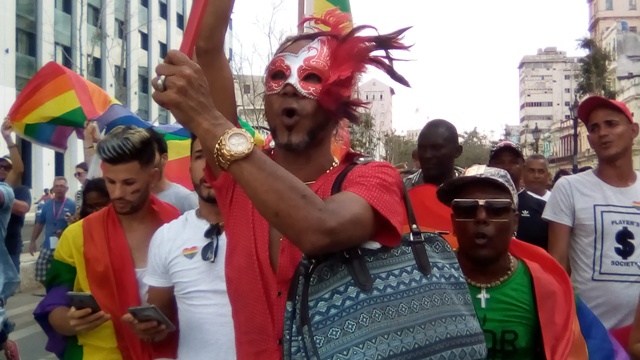
Participating in a March in Cuba, like the recently held “No to Animal Cruelty” or for LGBTIQ rights, has led me to question how much my social life and even my own sense of integrity were at stake.
After spending so many years in what passes for normality in Cuba, i.e. that almost all of our social relations are proposed and regulated by the State that also governs us, an understandable fear has taken root in light of the repression of these institutions against those who speak out or act differently, amongst a people that has long remained silent about the discrepancies between reality and utopia, that has lost their rights over the course of waiting for better times and for a change in the mistaken decisions of their leaders in power.
I decided to take part in those marches, because I was thinking about the good of others, because animals need representatives among humans who advocate for their rights. And because what has happened to the LGBTIQ community has been unjust. First of all, the government took advantage of a critical situation of those who were against same-sex marriage, which allowed it to redirect the attention of people more towards this issue than towards everything entailed in the project of the Constitution, which was approved very recently without the section that contained this request. Second of all, because of what had happened they suspended the realization of the only public expression they have as a community – a kind of Gay Pride that had been taking place every year.
The April 2019 march “No to Animal Cruelty” did not have as much obvious harassment, only a few police officers were present and other less visible civilian repressors. There was more of a sense of freedom and less of terror, because this march was known to have been authorized. This was an exhibition of people with their pets, carrying printed posters with written words on them and voices being raised in some chants. It was all a truly impressive display, one that did not seem possible, since it was something so unusual.
Compare this with the harassment suffered by those who took part in the LGTBIQ March in May of the same year. Here the marchers were escorted by crowds of people who were not part of the group and where the vast majority of them was not there out of solidarity. We came to realize that they hurried their steps, they always talked with two or three people who were acting like bosses – they were giving them orders, and they filmed and photographed us, without being just journalists – the latter are already known from other encounters. Among them were elderly people and people with other gestures, which were obviously there with different intentions. These people showered us with looks of anger or hatred, that were noticeably annoyed in that context.
This march had not been approved by any institution and even before it began there was no information about some of the people who knew they would be in attendance. They did not answer their cell phones and even their close relatives could not account for them.
This march ended with the arrest of some figures in opposition who are opposed to the Cuban government’s ways of acting and who supported the Cuban homosexual community on this occasion. Just like a fence that in principle only lets people out to foreign lands, the government was deploying the strength they possess in human and material means to be organized like an army, to demonstrate their superiority to civilians who only possessed their convictions.
Showing my solidarity and commitment to a cause that I consider just made me think about: What will happen if the justice might be on the other side other than ours? Would we still be able to be there to defend it or to defend ourselves?
It could be said that the majority of Cubans are unaware of these types of events, but it can also be said that the need to express what they think and to make their discontent visible it is being awakened in people, more and more. This leads me to believe that civic action continues to be a space for freedom to defend, which will allow us to express ourselves, denounce and / or demand our rights as long as Cuban social relations continue to be abnormal.

Leave a comment